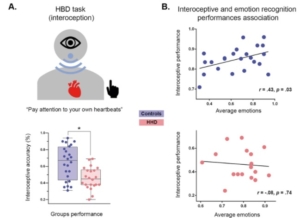Multicentric evidence of emotional impairments in hypertensive heart disease
Scientific Reports
Yoris, A., Legaz, A., Abrevaya, S., Alarco, S., López Peláez, J., Sánchez, R., García, A. M., Ibáñez, A. & Sedeño, L. (2020). Multicentric evidence of emotional impairments in hypertensive heart disease. Scientific Reports 10, 14131. Online: https://go.nature.com/2Qk4JNB.
En este trabajo investigamos el impacto de las alteraciones cardíacas en el reconocimiento de emociones faciales. Mediante datos obtenidos en dos países, mostramos que los pacientes con cardiopatía hipertensiva presentan déficits en el procesamiento de emociones, sobre todo aquellas negativas. A su vez, mientras que el procesamiento emocional correlacionó con la capacidad de monitorear los latidos del corazón en personas sanas, dicha asociación se vio vulnerada en los pacientes. Estos resultados contribuyen a caracterizar el rol de los sistemas viscerales en el procesamiento emocional.
Para acceder al artículo hacé click AQUÍ
Multicentric evidence of emotional impairments in hypertensive heart disease
Scientific Reports
Yoris, A., Legaz, A., Abrevaya, S., Alarco, S., López Peláez, J., Sánchez, R., García, A. M., Ibáñez, A. & Sedeño, L. (2020). Multicentric evidence of emotional impairments in hypertensive heart disease. Scientific Reports 10, 14131. Online: https://go.nature.com/2Qk4JNB.
The mechanisms underlying emotional alterations constitute a key research target in neuroscience. Emerging evidence indicates that these disruptions can be related to abnormal interoception (i.e., the sensing of visceral feelings), as observed in patients with cardiodynamic deficits. To directly assess these links, we performed the first multicenter study on emotion recognition and interoception in patients with hypertensive heart disease (HHD). Participants from two countries completed a facial emotion recognition test, and a subsample additionally underwent an interoception protocol based on a validated heartbeat detection task. HHD patients from both countries presented deficits in the recognition of overall and negative emotions. Moreover, interoceptive performance was impaired in the HHD group. In addition, a significant association between interoceptive performance and emotion recognition was observed in the control group, but this relation was abolished in the HHD group. All results survived after covariance with cognitive status measures, suggesting they were not biased by general cognitive deficits in the patients. Taken together, these findings suggest that emotional recognition alterations could represent a sui generis deficit in HHD, and that it may be partially explained by the disruption of mechanisms subserving the integration of neuro-visceral signals.
To access the full paper please click here



